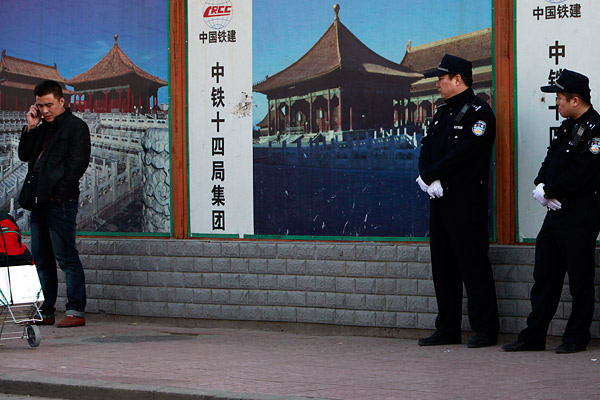
Chinese police officers watch an area near where China's top leaders are taking part in the party Central Committee's annual meeting Beijing, China, Monday, Oct. 17, 2011. (Han Guan-AP)
Top officials of China’s ruling Communist Party began a four-day, closed-door session Saturday which will be scrutinized for clues into the leadership transition that begins next year. The Central Committee’s annual plenum may also offer insight into how the authorities intend to promote, and control, cultural expression. The leadership will “draft further guidance, goals and major measures” for “socialist cultural development with Chinese characteristics,” as the state-run Xinhua News Service put it. If that sounds a bit opaque, police offered some more direct guidance on cultural development Saturday in the village of Songzhuang, about fifteen miles to the east of central Beijing. There about 100 film directors, critics, journalists and fans gathered in a courtyard under blustery fall skies for the opening of the 6th Beijing Independent Film Festival (BIFF).
The week-long event, which includes more than 50 fiction films, documentaries, animated shorts and experimental pieces, celebrates works produced outside the official system. They weren’t submitted to the State Administration of Radio, Film and Television beforehand, and thus can’t be shown in large theaters or distributed through regular channels. Some of the works show the darkest sides of life in China—environmental degradation, illegal land grabs, minority cultures pushed to the edge of oblivion—and were produced independently by necessity, because they could never survive an official review. But not all the films were so sensitive. Some were created by amateurs who didn’t have the formal training and connections to work in the mainstream, or experienced directors who prefer not having to deal with a censor, even if it means being cut out of the mainstream market.
The BIFF opening was held outside because the police forced at least two changes of venue, first from a local arts center and then from a hotel. The courtyard of the Li Xianting Film Fund, which is run by an arts critic and independent cinema backer, was lovely, though not an ideal spot for showing the opening film, Embracing Not Sleep, a fictional work about the relationship between two men forced to work in an illegal brick kiln. After Wang Hongwei, an actor who often appears in Jia Zhangke’s films, introduced the directors, the group squeezed into two rooms to watch the opener.
Then the cops arrived. A local official walked into one of the makeshift theaters and demanded, “What are you doing here? What are you watching?” The audience didn’t respond. Outside in the courtyard about a dozen police officers milled around, demanding identification from attendees. I watched as one young security guard who was helping the police walked up to a director and asked for his ID. “I don’t have it with me, and you don’t have the power to ask for it anyway,” the director told the security guard, who walked off with a confused look on his face.
During the opening ceremony, both Li Xianting and Wang Hongwei apologized for the change of venue and suggested that everyone treat it like a party. And it did feel like a party, especially after the police arrived, lending the air of a busted kegger. The cops didn’t shut down the event, but they tried their hardest to make it clear that the everyone was being watched and should probably just go home. This is the capital after all, and police didn’t want to be too aggressive, especially at an event where there were about as many video cameras as people. Many attendees left, but some returned later that evening, after the police had gone. In the halls of power, the Communist Party’s Central Committee plenum continues today. So too does the film party in Songzhuang.

